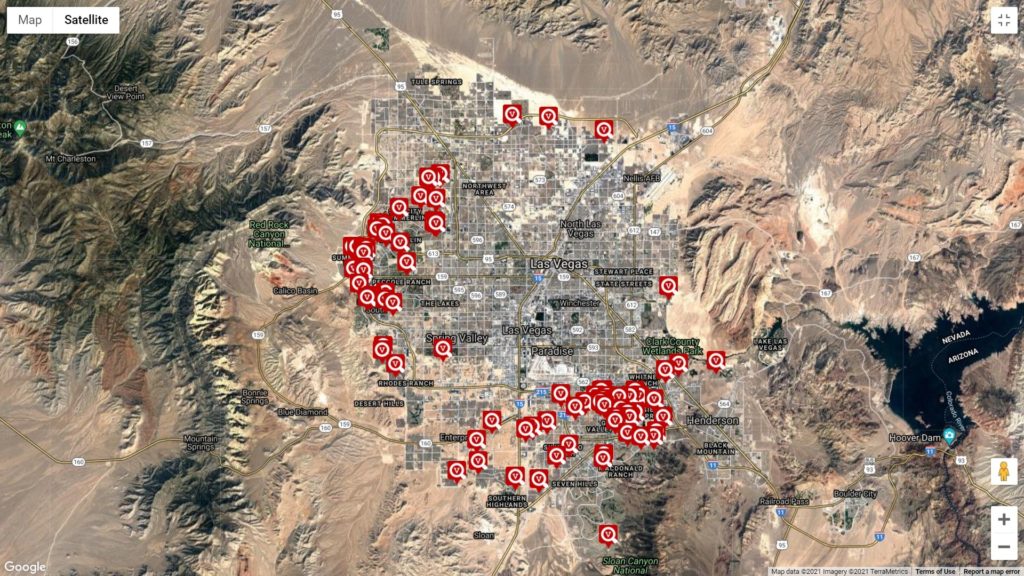Low property taxes are one of the main reasons Las Vegas investment properties are so attractive. As a general rule of thumb annual estimated property taxes can be calculated at roughly .5%-.75% of the purchase price. This public search page can be used to determine current property taxes for any property in Las Vegas and Henderson: Clark County Treasurer.
The amount of property taxes a homeowner pays is determined by multiplying the tax rate by the assessed value of the property, both land and improvements (the home). Nevada law NRS 361 states that the assessed value of a property is based on a ratio of 35% of the taxable value which is determined by guidelines established by the State Department of Taxation. Nevada law prohibits a taxable value that exceeds the full cash value of the home, and the county assessor is required to make a reduction if the owner calls to his or her attention the facts warranting it. The assessor may consider comparable sales based on prices actually paid in market transactions when determining whether taxable value exceeds full cash value.
In layman’s terms, the assessed value is only 35% of the estimated value, and then the tax is only 3.5% of that so you might only see 35% of the sellable value listed as the assessed value.
To calculate the tax on a new home that does not qualify for the tax abatement, let’s assume you have a house with a taxable value of $200,000 located in the City of Las Vegas with a tax rate of $3.50 per hundred dollars of assessed value. To determine the assessed value, multiply the taxable value of the home ($200,000) by the assessment ratio (35%): $200,000 X .35 = $70,000 assessed value.
To calculate the tax, multiply the assessed value ($70,000) by the tax rate (.035): $70,000 x .035 = $2,450.00 tax for the fiscal year.
NRS 361.4723 provides a partial abatement of taxes.
If the home has already qualified for a 3% or 8% tax abatement, taxes will be figured on the assessed value from the base year it qualified. Questions regarding a tax amount for a specific property should contact the Treasurer’s Office at (702) 455-4323.
Why did my Las Vegas proeprty taxes go up?
The Assessor is required by Nevada law to assess all property every year. The Assessor is required by law to assess all real property at current value, which is represented by the replacement cost of the improvement less depreciation and market value of the land. Nevada Administrative Code requires the Nevada Assessors to use Marshall & Swift Building Cost Service to determine improvement replacement costs, minus depreciation. The land is then appraised at market value. Marshall & Swift costs are updated each year to reflect current building costs.
Homeowners can contest property tax increases.
If, in your opinion, the taxable value of your property exceeds the value indicated in the real estate market, please call or come in to the Assessor’s Office and discuss your appraisal with an appraiser in the Assessor’s Office. The Assessor welcomes the opportunity to review any evidence you can provide that will show the valuation is unrealistic.
So, even if you can’t change the tax rate, you can try to do something about how your home is valued. Review your assessment for accuracy, including the size of your lot and the number of bedrooms and bathrooms. Research the assessed value of other comparable homes in your neighborhood; if they’re being assessed differently, you may have a case for relief. Review your taxable value and check with a REALTOR® to determine comparable sales in your area if you believe the taxable value is too high.
Homeowners who believe that the market value of their property is less than the taxable value listed on the assessment roll or believe that they were assessed differently than comparable property may contact the Assessor’s Office Appraisal Division at 702-455-4997 for an explanation of the values. If not satisfied after speaking with the Assessor’s Office, a property owner may file a petition with the County Board of Equalization for a review of the values.
Even if your assessment is accurate, and comparable homes are being taxed at the same rate, there might be another way to see some property tax savings. Nevada law provides for several exemptions for individuals who meet certain requirements. Exemptions include surviving spouses, veterans, disabled veterans and blind persons.
Curious about the SID/LIDS in Las Vegas? We have a written this article for further information.
Put a Cap On It! - Tax Cap & Abatement Information
Have you checked to see what rate your property tax is being capped at this year? If not, you need to be aware that the tax cap status of your property may be set to the default, which is the higher abatement (“high cap”), and will remain at the higher general abatement level until a qualifying claim is filed.
Currently, properties qualifying as the owner’s primary residence will receive a 3% tax cap, all other properties are subject to the “Other” tax cap, also known as the “commercial property tax rate”, which can be up to 8% but this year is set at 4.8%.
Even so, property owners need to “claim their abatement” to ensure they are receiving the 3% tax rate on their primary residence. Moreover, if a property owner was over charged, they have until June 30, to appeal. You may be asking, “how do I file my claim?” Good question. In May of each year, most local county assessor offices directly mail a card, form, or affidavit to the owners of residential properties.
These notices must be returned by June of each year. The claim forms are also sent out when there is a change of ownership, construction has been completed, significant change in the owner’s name or mailing address.
IMPORTANT: If the form is not completed and returned, the “tax cap” status will remain at the higher general abatement until a qualifying “opting in” claim is filed. If the rental property is managed by a property management company, the management company may complete the form on the Owner/Landlord’s behalf but when submitting the form, it should be accompanied by a copy of the property management agreement or other documentation demonstrating authority to sign. Once the assessor receives the form and updates their records, that information is typically forwarded to the Treasurer’s Office to make the tax adjustments.
You can view your tax cap percentage by visiting the Treasurer’s website. They will tell you whether your current rate is 3% or if you need to fill out a form, in which case they will mail you another one. You should be aware that properties other than primary residences may qualify for low cap abatement.
Check with your local county to see if there is a special provision that qualifies your property for low cap abatement. — Clark County Assessor’s Office: 702-455-3882 or 702-455-4997 Clark County Treasurer: http://www.clarkcountynv.gov/treasurer/pages/default.aspx (have your parcel number handy).

Owner FAQs
Our Owner FAQ section was designed to help navigate some of the questions that come up in property management.

Pricing
Our firm has crafted a culture designed around full transparency, reliable communication, and technology.

Areas We Serve
We are selective when it comes to new partnerships in ensure we provide the highest level of attention to each Owner.
